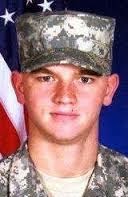Whoever speaks should do so as those who speak God's word. Whoever serves should do so from the strength that God furnishes. Do this so that in everything God may be honored through Jesus Christ. To him be honor and power forever and always. Amen. - 1 Peter 4:11This scripture from 1 Peter speaks powerfully of our responsibility as Christians to speak God's truth and to act in ways that are consistent with our faith, so that God may be honored in all that we say and do. These words remind us that we are called to speak - to share the stories of our faith - so that God's truth may be known. If we do not do this, who will?
As we honor those who have served our country in military service this Veterans Day, these words also remind me how important it is that we share other stories, as well.
This week, I came across three different stories about veterans. The first, from England, tells of a man who faced the horrors of World War II in the desert of North Africa and returned home traumatized by his experiences. "Don't mention the war" was the tacit understanding in his household, as the man withdrew into his own reality more and more frequently. He died in his fifties, a broken man.
You can read more about this story here.
The second is the story of Rev. Dr. Wilson Canafax, whose life we celebrate today. Wilson died last week at age 95. WWII was also a defining moment in his life. But his stories did not remain silent. Wilson shared with others his story of visiting the recently-liberated Dachau Concentration Camp and meeting a young teenager who spoke perfect English. After learning that Wilson was an Army Chaplain, the boy asked him to take a tour of the camp and also to provide a Jewish service for those who could attend. Years later, Wilson reunited with this boy, who grew to be the Nobel Peace Prize winner Elie Wiesel.
You can watch a video of Wilson sharing this story, here.
Two lives: one whose stories were shrouded in silence and whose life was cut short by depression; one whose stories were shared. Wilson also battled depression, which he attributed to his war experiences, his whole life. But in sharing his stories, he shared his burden. And he educated us and made the horrors of war more real, and somehow more bearable. Wilson's stories brought a human element into something we can barely imagine. And they gave us hope that even in the darkest times, something good can happen.
One final story took place last week, as Army Specialist Jason Shelton was brought home for the final time after a fatal injury during training. Blogger Brad Willis watched as Shelton's casket was carried off the plane (I highly recommend you take time to read his story, here.)
Willis points out that for many years (1991-2009), there was a ban on photos of military caskets coming home. He writes, "It's a good thing we can now see the pictures of our fallen soldiers coming back to America. If we stop bearing witness to their deaths, then we forget the meaning of what they do and the reason they are there."
Three stories of why it is so important to tell our stories. I think we get this. I think we understand that remaining silent about things that are hard to bear is not the best way to honor those who have served or to keep us from repeating past mistakes.
As Christians, we are called to tell a different story. Our story is not of war, but of God's Kingdom. We are called to tell the story of our God, who came to earth in the flesh, to teach us how to live. And in spite of his words and actions of love and compassion, Jesus was killed on the cross. But death did not have the last word.
Ours is a story of victory - not just one time for one person, but for all people, for all time. We know how important stories are: Veterans Day reminds us of this. We, too, have "a story to tell to the nations." 1 Peter 4:11 reminds us that the strength to tell this story - this story that honors God - comes from our God.
Let us not be silent.
But in the days to come, the mountain of the LORD's house will be the highest of the mountains; it will be lifted above the hills; peoples will stream to it. Many nations will go and say: "Come, let's go up to the mountain of the LORD, to the house of Jacob's God, so that he may teach us his ways and we may walk in God's paths!" Instruction will come from Zion and the LORD's word from Jerusalem. God will judge between the nations and settle disputes of mighty nations, which are far away. They will beat their swords into iron plows and their spears into pruning tools. Nation will not take up sword against nation; they will no longer learn how to make war. All will sit underneath their own grapevines, under their own fig trees. There will be no one to terrify them; for the mouth of the LORD of heavenly forces has spoken. - Micah 4:1-4The Monday Connection:
- What is my story of the Christian faith? Who am I sharing it with?
- Everyone has a story. Too often, stories are left untold in our busy world. We forget to sit down together and talk and listen to each other. Who can I invite to share their stories with me this week?



No comments:
Post a Comment